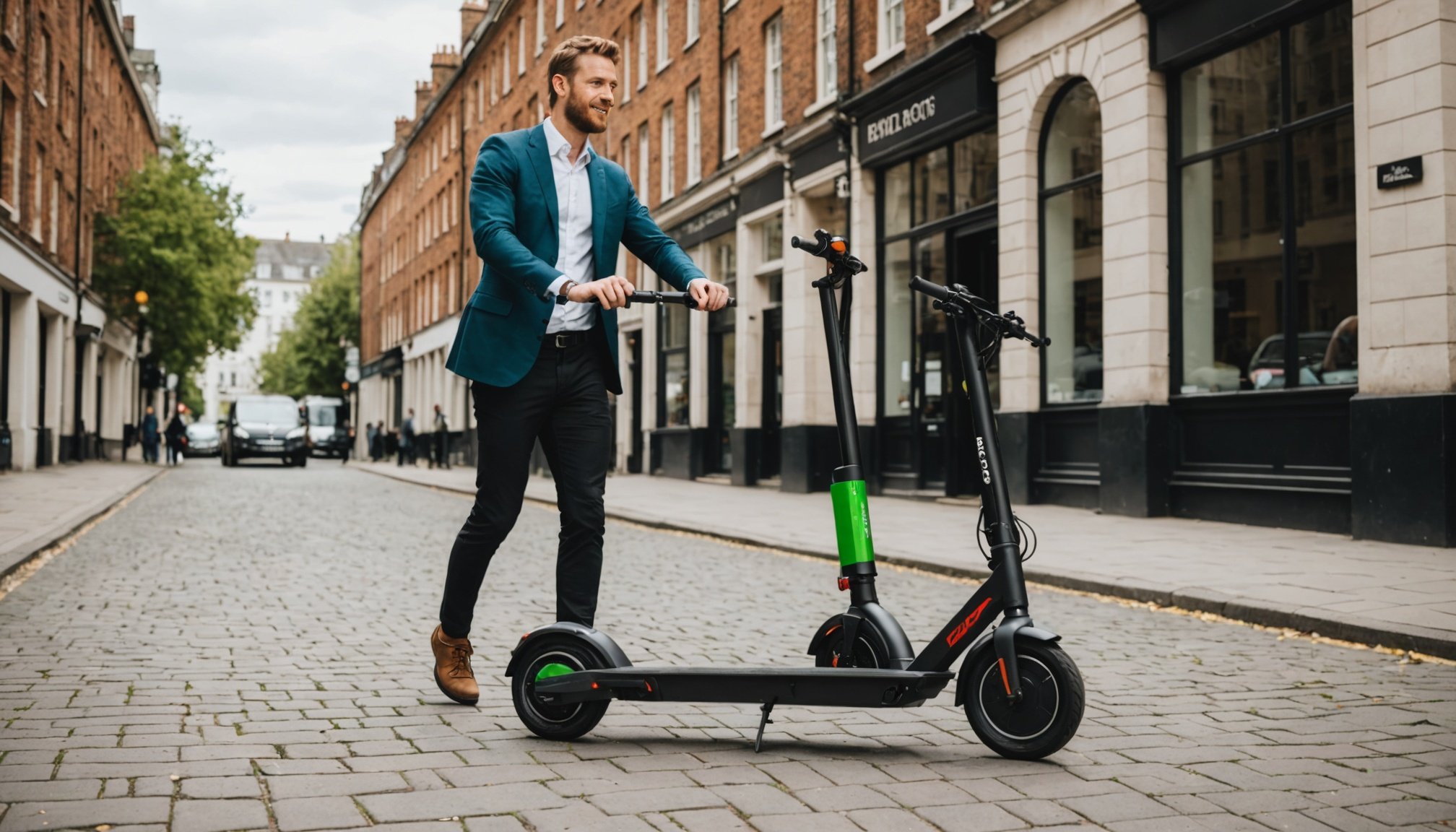Overview of Electric Scooters in the UK
Electric scooters are increasingly central to UK mobility trends. Their popularity is fueled by their role in promoting green transportation within busy urban environments. Recent statistics show a significant surge in their usage across the country. For instance, a rise in electric scooter sales by an estimated 30% over the past year demonstrates their growing acceptance as a viable transport option over traditional forms like bicycles or cars.
Key players, such as Lime and Bird, dominate the electric scooter market, providing innovative solutions and services tailored to urban commuters. These companies often collaborate with local councils to create efficient systems and foster environmentally friendly transit options, underscoring the commitment to sustainable urban mobility.
Additional reading : Fostering Continuous Growth in UK Schools: Proven Strategies for Cultivating a Vibrant Improvement Culture
In comparing electric scooters to traditional transport forms, their advantages include enhanced sustainability, reduced congestion, and diminished carbon emissions. Traditional vehicles, while necessary, often contribute to increased greenhouse gases and urban noise. Electric scooters offer a compelling alternative, aligning with the broader shift towards eco-conscious urban planning. They are not only more environmentally friendly but also economically advantageous, reducing commuter costs and promoting public health through the reduction of air pollutants.
Environmental Benefits of Electric Scooters
Electric scooters present a significant opportunity to mitigate the environmental impact of urban transportation. One of their primary benefits is the reduction of greenhouse gas emissions. Unlike cars, which contribute substantially to carbon emissions, electric scooters operate on rechargeable batteries with zero emissions during use. This not only helps curb carbon footprints but also supports cities’ sustainability goals.
In parallel : Unlocking Success: The Ultimate Guide to Digital Transformation Strategy for the UK Public Sector
Furthermore, electric scooters play a crucial role in enhancing urban air quality. By decreasing reliance on petrol-powered vehicles, they diminish air pollutants, fostering a healthier living environment. Additionally, the quiet operation of electric scooters contributes to a reduction in noise pollution, making city streets more pleasant and less disruptive.
It’s vital to consider the entire lifecycle of electric scooters when assessing their sustainability. From sourcing materials to end-of-life recycling, manufacturers increasingly prioritise eco-friendly practices. Initiatives like using recycled materials for production and implementing effective battery recycling programs help maintain the sustainability of these vehicles.
By integrating electric scooters into urban transport ecosystems, cities can make substantial progress towards reducing their environmental footprint, contributing to global efforts to battle climate change and advance green transportation solutions.
Government Initiatives Supporting Electric Scooters
Electric scooters have garnered significant attention within the framework of UK government policy. Recent years have witnessed a growth in initiatives aimed at promoting their use, a testament to the government’s commitment to sustainable urban mobility. With pilot programs cropping up across various cities, the local authorities are actively testing the waters to understand the practicality and implications of electric scooters on city infrastructure.
In London, for instance, city-specific regulations are crafted to ensure that electric scooters can coexist meaningfully with other forms of transport. These regulations often involve speed limits, designated parking areas, and permitted riding zones. The government’s focus is on creating a safe and efficient infrastructure development that supports widespread use.
A commendable role of the government lies in ensuring rider safety and facilitating smooth traffic flows. For electric scooters to be a long-term component of urban mobility initiatives, stringent but practical measures are critical. The success of these initiatives largely hinges on their ability to balance safety concerns with the burgeoning needs of greener, more agile city travel solutions. Through continuous regulation updates and infrastructure investments, the government actively shapes the future of electric scooter usage.
Case Studies of Electric Scooter Impact
Exploring successful implementations of electric scooters in the UK unveils insightful narratives about their role in reshaping urban dynamics. In Birmingham, for example, a partnership with Voi achieved notable success, reducing city congestion. The program initiated managed to replace short car trips, illustrating a seamless shift towards green mobility results. Additionally, satisfaction reports indicate widespread enthusiasm, demonstrating user adoption is high due to convenience and environmental benefits.
In Bristol, economic impacts are similarly positive. The scooter initiative not only boosted local employment through fleet management jobs but also encouraged spending at local businesses as ease of transportation increased footfall. These city case studies highlight the real-world benefits that electric scooters can deliver.
Yet, underlying these successes are the strategic investments in infrastructure and management. Coordinated docking stations and user-friendly apps are some facets aiding in their effective deployment. Policymakers are taking note, inspired by these models to replicate and refine such approaches nationally. These case studies serve as a testament to the transformative power of electric scooters in fostering healthier, more connected urban environments. As cities strive for greener futures, such examples set a precedent, encouraging wider implementation.
Challenges Facing Electric Scooter Adoption
Safety concerns are a notable barrier to electric scooter adoption. Incidents involving scooter accidents can deter users and concern communities. Addressing safety involves implementing stringent laws and promoting responsible riding practices, like wearing helmets. Scooter companies must invest in technology that enhances safety, such as improved braking systems and lights.
Infrastructure challenges also hinder deployment. UK cities traditionally lacking dedicated scooter lanes pose a risk for riders navigating busy streets. Urban planners are tasked with integrating scooter-friendly pathways to ensure safe journeys. Expanding infrastructure requires collaboration between scooter companies, local authorities, and transport planners.
Public perception is another hurdle. Skepticism surrounds their sustainability and environmental impact, with critics questioning lifecycle emissions. Educating the public on the eco-friendly benefits of electric scooters and their potential to reduce urban congestion is crucial. Furthermore, addressing misconceptions about their effectiveness compared to traditional transport modes can enhance acceptance.
Persistent efforts to tackle these challenges are crucial for the success of electric scooters in the UK. Initiatives must focus on safety, comprehensive infrastructure planning, and transparent, fact-based communication. Together, these strategies can pave the way for efficient, widespread electric scooter adoption.
Comparisons with Other Green Transport Options
In the realm of green transport alternatives, electric scooters hold a distinct position when compared to other mobility solutions such as electric bikes and public transport. Users often prefer electric scooters for their nimbleness and convenience in urban settings, especially for short commutes. However, it’s crucial to weigh these against other mobility trends.
Unlike electric bikes, which offer greater range but require physical effort, scooters provide an effortless ride. On the other hand, public transport, while generally eco-friendly, lacks the same individual flexibility and sometimes leads to longer travel times due to fixed routes and schedules. Each option has its costs and benefits, with scooters often seen as more economical for solo, short-distance travel.
When assessing these green transport alternatives, users tend to focus on specific needs such as time efficiency, cost, and environmental impact. For instance, scooters excel in reducing congestion, while public transport greatly minimizes the collective carbon footprint. The increasing adoption of these options highlights a broader mobility trend towards integrating various forms of eco-friendly transport to accommodate diverse commuter preferences within rapidly evolving urban landscapes.
Future Trends in Electric Mobility
The future of transport in the UK appears increasingly intertwined with advancements in electric mobility. There are exciting predictions for the technology developments of electric scooters, promising more efficient and smarter designs. Innovations such as improved battery longevity and integrated smart features like GPS tracking provide users a more efficient ride, catering to tech-savvy commuters.
Potential shifts in regulations and urban planning could further impact electric scooters. Urban planners anticipate the need for expanding dedicated lanes and environmentally conscious zones to accommodate these trends. This will likely enhance safety for riders and pedestrians alike, promoting safer incorporation into existing traffic systems.
User experience is set to dramatically evolve with integration across transit systems. Imagine a future where electric scooters complement buses, trains, and bikes as part of a seamless urban mobility network. App-based solutions will likely enhance this integration, offering real-time updates and easy access to scooters.
These trends highlight an optimistic trajectory for electric scooters, underscoring their role in shaping the landscapes of cities. As they continue to develop, electric scooters will likely remain at the forefront of a global shift toward sustainable, connected urban environments.
User Regulations and Safety Tips
Navigating UK laws concerning electric scooters is essential for riders. In the UK, electric scooter use is subject to specific usage regulations to ensure rider protection. Riders are only allowed to operate electric scooters on private land or within pilot program areas, with a maximum speed limit generally set to 15.5 mph in these zones. Helmets, while not mandatory, are highly recommended.
Adhering to safety tips can significantly enhance the riding experience. Key practices include:
- Maintaining awareness of surrounding traffic and always using designated paths.
- Keeping scooters well-maintained, checking for any mechanical issues before riding.
- Avoiding distractions like mobile phones while operating the scooter.
Additionally, wearing protective gear is paramount. This includes helmets, knee pads, and reflective clothing to increase visibility. Responsible riding practices not only protect the rider but also contribute to public safety, encouraging more welcoming attitudes towards electric scooters.
By understanding and respecting regulations, and prioritizing safety, riders can enjoy a secure and pleasant experience. Educating oneself on these aspects is crucial in fostering a respectful and informed electric scooter community.








